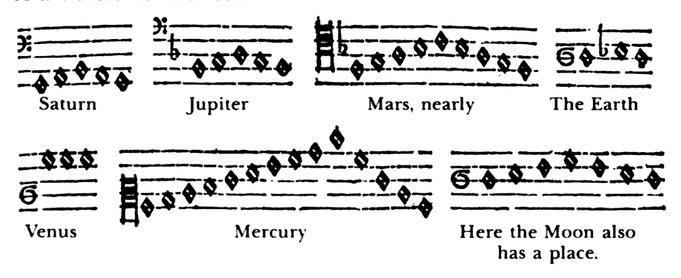Johannes Kepler Theorized That Each Planet Sings a Song, Each in a Different Voice: Mars is a Tenor; Mercury, a Soprano; and Earth, an Alto

Johannes Kepler determined just how the planets of our solar system make their way around the sun. He published his innovative work on the subject from 1609 to 1619, and in the final year of that decade he also came up with a theory that each planet sings a song, and each in a different voice at that. Mars is a tenor, Mercury is a soprano, and Earth, as the BBC show QI (or Quite Interesting) recently tweeted, "is an alto that sings two notes Mi and Fa, which Kepler read as 'Miseriam & Famem', 'misery and famine'" — two phenomena not unknown on Earth in Kepler's time, even though the scientific revolution had already started to change the way people lived.
Not all of the best minds of the scientific revolution thought purely in terms of calculation. The blog ThatsMaths describes Kepler's mission as explaining the solar system "in terms of divine harmony," finding "a system of the world that was mathematically correct and harmonically pleasing." Truly divine harmony could presumably find its expression in music, an idea that led Kepler to explain "planetary motions in terms of harmonic relationships, a scheme that he called the 'song of the Earth.'"
According to this scheme, "each planet emits a tone that varies in pitch as its distance from the Sun varies from perihelion to aphelion and back" — that is, from the nearest they get to the sun to the farthest they get from the sun and back — "producing a continuous glissando of intermediate tones, a 'whistling produced by friction with the heavenly light.'"
Kepler named the combined result "the music of the spheres," but what does it sound like? Switzerland-based cornettist Bruce Dickey wants to give us a sense of it with Nature's Whispering Secret, "a project for a CD recording exploring the ideas about music and cosmology of Johannes Kepler." Demanding the musicianship of not just Dickey but composer Calliope Tsoupaki, singer Hana Bla?íková, and a group of singers and instrumentalists from across Europe and America as well, all "among the most distinguished musicians performing 16th-century polyphonic music today." The Indiegogo campaign for this ambitious tribute to Kepler's ideas at the intersection of science and aesthetics, which involves an album as well as a series of live performances into the year 2020, is on its very last day, so if you'd like to hear the music of the spheres for yourself, consider making a contribution.
Related Content:
Hear the Declassified, Eerie “Space Music” Heard During the Apollo 10 Mission (1969)
NASA Puts Online a Big Collection of Space Sounds, and They’re Free to Download and Use
The Soundtrack of the Universe
Kepler, Galileo & Nostradamus in Color, on Google
Based in Seoul, Colin Marshall writes and broadcasts on cities, language, and culture. His projects include the book The Stateless City: a Walk through 21st-Century Los Angeles and the video series The City in Cinema. Follow him on Twitter at @colinmarshall, on Facebook, or on Instagram.
Johannes Kepler Theorized That Each Planet Sings a Song, Each in a Different Voice: Mars is a Tenor; Mercury, a Soprano; and Earth, an Alto is a post from: Open Culture. Follow us on Facebook, Twitter, and Google Plus, or get our Daily Email. And don't miss our big collections of Free Online Courses, Free Online Movies, Free eBooks, Free Audio Books, Free Foreign Language Lessons, and MOOCs.
from Open Culture http://bit.ly/2JDmFBo
via Ilumina
Comments
Post a Comment